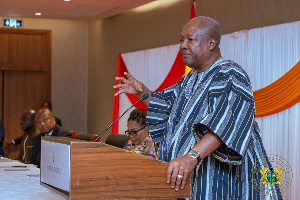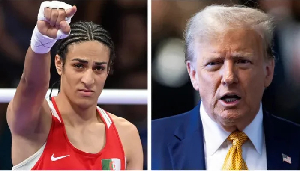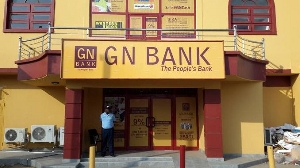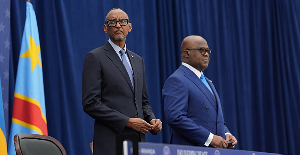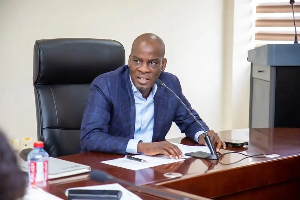*IMANI Report: Seized Argentine Ship a victim of decades of failed economic management, corruption and populism*
* *
On Thursday, October 4, 2012, the ARA Libertad, an Argentine Military Training ship which berthed at Tema Port, was seized on the orders of a Ghanaian High Court much to the chagrin of the entire Argentine government.
The High Court in Ghana granted NML Capital Limited, ‘a commercial creditor of the Republic of Argentina, an injunction and interim preservation order against the ARA Libertad, The order required the Libertad to remain at Tema Port, pending hearing on the enforcement in Ghana of judgments against Argentina issued by the United States District Court for the Southern District of New York, supported by similar judgments in London. Argentina may obtain release of the ship however, by posting a bond with the High Court in Accra’ a significant departure from the nearly $300m debt owed since 2001. That came to pass and the courts in Ghana posted a bond of $20 million dollars or in default give up the Ship, which, by the way, the Argentines have said they are prepared to do, to save (what is left of) their ‘national dignity’. The Argentine President, Cristina Fernandez in a speech broadcast to the world, reiterated her earlier call that “As long as I am President, they can keep the frigate but not the liberty, sovereignty and dignity of this country”. “No vulture fund, no one gets to keep that”, she added. The Argentines may also hope against hope by using its temporary membership of the UN Security Council to compel Ghana to release the ship.
Here is how Argentina got herself in this mess.
A few decades ago she borrowed money by floating bonds and other financial instruments. Being a viable country then, its bonds were patronized and people lent her millions of dollars which they used up with the promise to pay back as scheduled. Argentina couldn’t pay back; the debts became a problem, and were inherited by successive Argentine governments. Records show Argentina owes a total of $100bn to lenders. Funds like Paul Singers’ bought Argentine debts on the secondary market, but facing the attitude of the Argentine government which US Judge Thomas Griesa, (who presided over many of these cases) has described as “doing everything they can to resist paying legitimate judgments”, they have resorted to a crusade to recover the money, usually by chasing Argentine assets around the world. The Argentine government has also declared war against the so called “Vulture Funds” and has been playing real life hide-and-seek, with these creditors.
In spite of the global embarrassment the saga has brought to the Kirchner administration and to an extent the Ghanaian government, it appears popular opinion about Ghana in Argentina, was what an Argentine Journalist said to IMANI principals last week; that Ghana was a thought of as a banana republic, and needed bullying, at least the kind that plays out within the corridors of power. How such conclusion could be reached in spite of the distant diplomatic relations that exists between the two countries beats any one’s imagination. The coolest part of this saga is that ordinary Ghanaians just do not care, let alone entertain fears of an aggressively bold but discordant chest-thumping declaration of ‘war’, as the ship involved is a decorated war ship.
At least, there is another reason Argentina is furious. Its dignity, yes, Argentina’s “national dignity”.
But a contest of dignity when it comes to financial liability between Argentina and Ghana is another play ground the former looks already drawn. Throughout the late 90s and early 2000s, Argentina witnessed daily riots and violence, ‘a procession of presidents-for-a-day, and the gathering doom of default and devaluation’. Coupled with grand official corruption, the country simply collapsed from its near first world status to the rungs of the very poor within the poor in the world. There were a few promising times, but even those times under President Carlos Menem for instance was marked by allegations of corruption and his personal involvement in arms deal. After 5 months of a house arrest, Menem was released by his hand-picked Supreme Court friends.
Transparency International, the think tank that surveys and publishes the annual index of corruption levels, in 2001, Argentina ranked a dismal 57th out of 91 countries. Worse, in other words, than Botswana, Namibia, Peru, Brazil, Bulgaria, and Colombia. Ghana was ranked 59th in 2001. The following year, Ghana ranked 50th and Argentina placed 70th in 2002. In 2004, Ghana ranked 64th whilst Argentina ranked 108th. In 2007, Argentina ranked 105th and Ghana 69th. In 2009, Argentina placed 107th and Ghana 69th. Argentina ranked 105th and Ghana placed 62nd in 2010. In 2011, Ghana ranked 69th whilst Argentina did with 100th.
On the economic freedom index, Ghana edges Argentina in several categories and ultimately the cumulative scores for many years. Economic freedom is achieved when individuals in a country have the freedom to think, make choices, own property that is acquired without let or hindrance and able to use whole or aspects of the priority to engage in voluntary exchange. The Economic Freedom of the World measures the degree to which policies and institutions of countries are supportive of economic freedom. Forty-two variables are used to construct a summary index and to measure the degree of freedom in five broad areas: the size of government; Legal System and Property Rights; Sound Money; Freedom to Trade Internationally and Regulation. The table below shows exactly which of the two countries have been more free.
Country
2002
2003
2004
2005
2006
2007
2008
2009
2010
Argentina
83rd/123 countries surveyed
99th/127 countries surveyed
83rd/130 countries surveyed
112nd/ 141 countries surveyed
110th/141 countries surveyed
99th/141 countries surveyed
113rd/141 countries surveyed
119th/141 countries surveyed
127th/144 countries surveyed
*Ghana*
76th
58th
72nd
83rd
56th
72nd
64th
70th
71st
The historical account that lends itself to the dilapidated economy of Argentina is to be premised on the administration of President Juan Perón in 1946. On the crucial question of judicial independence, Brink Lindsay, a Cato Scholar wrote “Prior to the descent into statism, justices of Argentina's Supreme Court enjoyed long tenures undisturbed by political interference. At the beginning of Juan Peron’s first administration in 1946, Supreme Court justices averaged 12 years on the bench. It's been downhill since then. Since 1960, the average tenure has dropped below four years. After Perón (he left the presidency for the second time in 1974), five of 17 presidents named every member of the court during their term, a distinction that had previously been limited to Bartolomé Mitre, the country's first constitutional president (1862-1868). And so, while before Perón, it was typical for a majority of the court to have been appointed by presidents from the political opposition that was no longer the case. The Supreme Court, the supposed bulwark of the rule of law, was reduced to a puppet of executive power”
Against the above background, it was reprehensible to hear The Argentines impugn our judicial system by stating their mistrust of our Legal system, with Ambassador Susana Ruiz Cerrutti declaring that Argentina will be going directly to international tribunals instead of submitting to Ghanaian courts because it mistrusts the impartiality of the local Courts. She is entitled to that, but it betrays Argentina’s lack of appreciation of the strides Ghana has made in building institutions of progress.
After years of military rule which many blame for Ghana’s economic stagnation, Ghana has had an unbroken democracy for almost 20 years. There have been pitiable occurencies just as there has been positive. In this regard, Ghana and Argentina offer a contrast. Ghana, like much of Africa, is growing and its economy is expanding. It emerged from its Highly Indebtedness and Poor Country Initiative (HIPC) status and recently has sold Eurobonds — at an interest rate that Argentina can only dream about. This is because Ghana has a strong tradition of the rule of law. This is a bipartisan tradition. Argentina, on the other hand, has repudiated its debts and does not obey court judgments in New York, the UK, at the World Bank (ICSID) and now Ghana. This is why investment is fleeing Argentina, its economy is in shambles, and it has attracted the rebuke of the IMF earlier this month.
The general ethos of the discussion is that the rule of law must be made to prevail in Ghana, and no politician or foreign power should tamper with that. This singular judicial decision raises many dimensions of the nature and future of power relations within and without Ghana. Among others, it examines;
· The real strength of our judiciary and its ability to protect citizens (if it can protect foreign interests against our government then it can protect citizens against the powers that be).
· The rule of law including international law and whether our judicial system will continue to assert itself in complex international matters.
· The state of our political system; whether we have matured to the point where politicians will allow the law to take its course and not intervene even when it is uncomfortable.
· Whether our leaders are beyond bullying and pressuring by a bigger nation (Argentina). Something we will need when dealing with China and the EU.
· Crucially this is not a Ghana versus Argentina matter. This is not as some have put it in the international media, Ghana taking on Argentina, this is truly a simple case of a court hearing a matter and making a ruling on the basis of law and the evidence in front of it, the nation Ghana has no direct interest in this matter except to uphold the law as all civilized nations do. Indeed many Ghanaians resent the suggestion that our courts are not capable of independent decision making and thus this must have been the directive of some politician!
· Ghana is a NOT banana Republic and that we have paid our dues in economic failure, serviced our debts and those we were forgiven were due to good behaviour in terms of respect for the tenets of democracy, the rule of law, free enterprise, respect for contracts and decentralised management of power and resources, principles that are sorely lacking in present day Argentina prior to their debt predicament and total disregard for international justice.
· That no amount of diplomatic pressure and by extension executive force can be brought upon our Judiciary to change its earlier ruling.
· That Argentina’s actions constitute a serious erosion of the rights of foreign investors. Accordingly, Ghana’s courts must be praised for doing the right thing re the Libertad.
· The lesson from this is that Governments that incur foreign debt are mature adults, who should take responsibility for their actions and pay their debts. They, and hopefully their countries, benefited from the finance they received, and it is morally reprehensible to expect their financiers to pay for their failure to honour their obligations. It is also morally reprehensible, specifically demeaning and patronising, to treat these governments as if they are juvenile delinquents.
* *
*IMANI is a Think Tank of considerable local and international repute and significance. In 2009, The Foreign Policy Magazine named IMANI, the fifth most influential think tank in Africa. In 2010, IMANI was the only named African think tank ranked in the top 25 most innovative think tanks in the world. In 2011 IMANI was voted the 6th most effective Think Tank in Africa and among Top 20 most innovative think tanks globally In 2010 IMANI led the World Bank's Africa region's taskforce within to investigate what Africans needed from the World Bank. Kofi Bentil, Vice-President, IMANI and Founding President, Franklin Cudjoe are on standby for interviews. Please contact Shulamite Maison on 0302 40 99 03 to arrange interviews.***
Opinions of Sunday, 28 October 2012
Columnist: IMANI


